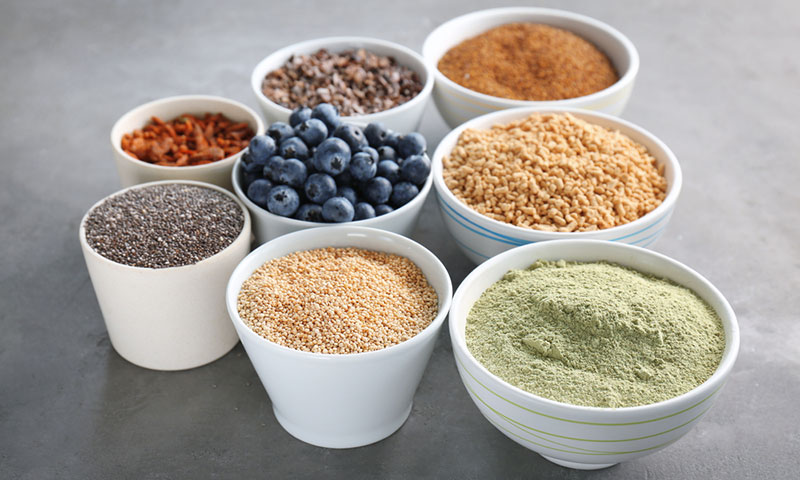In recent years, several studies have looked at the ever-increasing popularity of functional foods containing bioactive compounds that positively affect the body (1).
The foods I’m referring to most people know as “superfoods.” These foods play a critical role in strengthening and promoting a more effective immune system functioning.
Some of the bioactive components identified in superfoods directly linked to a healthier immune system are polyunsaturated fatty acids, vitamins, minerals, essential amino acids, and probiotic organisms.
We all know that a healthy immune system is critical in staying fit, but what is the immune system? What role does it play? And what foods help boost your immune system?
The Immune System
Understanding how the immune system works is vital in pursuing health, well-being, and longevity.
The immune system has two primary systems :
- The Innate
- The Adaptive
Put simply; the immune system prevents infection. However, in reality, it’s a complex system that identifies unhealthy cells.
When problems arise, the immune system activates a response to fight the infection or virus that has entered the body. Several cell types circulate within the body, and each cell type communicates with other cells uniquely.
For the immune system to function correctly, essential vitamins and trace minerals are needed. Fortunately, several foods provide these and boost your immune system.
Mushrooms
Mushrooms play a pivotal role in strengthening our immune systems and have been directly linked to reducing some cancers.
They do this by boosting T cells’ production, helping the immune system fight tumors and infections.
Although mushrooms are healthy, there are various poisonous species, so make sure the mushroom you have chosen is edible. Maitake, Reishi, and Button mushrooms are excellent choices available at your local supermarket.

Goji Berries
Goji berries are found in Tibet’s highlands and are rarely found fresh (2).
The berries are rich in nutrients with high levels of vitamins C, E, B1, and 2, along with antioxidants and amino acids. Goji berries contain 18 amino acids and 21 trace elements and have a vitamin C concentration 500 times higher than oranges.
Goji berries play a critical role in protecting the body from harmful free radicals and preventing diabetes; they have been linked to regulating blood sugar levels and preventing insulin resistance, both vital factors in preventing type two diabetes.
As with most superfoods, goji berries help reduce inflammation, stop the blocking of blood vessels, and decrease cancer risk due to the berries’ antioxidant properties.
Spinach
Leafy green vegetables like spinach and kale contain pigments that increase nitric oxide. Nitric oxide plays several vital roles, including blood flow and platelet function, helping prevent blood clotting.
Spinach also contains magnesium, which lowers blood pressure and fights depression.
Spinach also promotes health and decreases anxiety and stress. It also benefits eye health, reduces oxidative stress, and reduces blood pressure levels among other health functions.

Garlic
Besides tasting great in various ways, garlic has a lovely aroma that adds flavor to any recipe. Garlic contains over 30 sulfur compounds, most of which possess antibacterial and anti-inflammatory properties.
Coupled with various critical enzymes and amino acids, garlic is used to treat influenza, arthritis, cancer, and constipation.
Compared with white garlic, black garlic has double the amount of antioxidants and is a powerful superfood used to treat Type 2 diabetes, colon cancer, and heart disease. I Ferment “black garlic” at home, and I recommend giving it a go.
Garlic has proven itself over millennia as an effective scavenger of bacteria and viruses. The allicin that is contained in garlic plays a major role in this process.
Research studies show that raw garlic has antibacterial and antiviral properties.
Ginger
Ginger is classified as a “superfood” due to the number of vitamins and minerals it contains.
Ginger originated in South East Asia but is found in most tropical countries. The ginger root itself consists of 80% water and contains potassium, zinc, and polyphenols.
The polyphenols in garlic have several health benefits and are linked to cardiovascular disease prevention (4). The inorganic compounds help with digestion, and the high levels of vitamin C and Zinc are responsible for anti-inflammatory activity.
Ginger also possesses antioxidants, which protect the immune system. Ginger is also linked to reducing oxidative stress levels, which leads to diseases such as Alzheimer’s.
Ginger is an excellent remedy for women suffering from morning sickness and reduces muscle pain.

Green Tea
Tea comes from the Camellia Sinensis plant’s leaves and is the second most popular drink globally. Due to its popularity and its vast consumption, research on tea and its many benefits are plentiful.
Tea undergoes a process of drying, steaming, and fermentation. This process releases the polyphenols found in tea that helps with oxidation. On average, tea leaves contain 36% polyphenols, 25% carbohydrates, 15% proteins, and about 5% of amino acids.
In Japan, ten-year study participants who consumed 10 cups of tea compared to those who drank 3 cups showed a significantly decreased risk with various cancer types (3).
Research suggests the polyphenols found in the tea protect neurons in the brain and prevent the cell’s death. The antioxidants also show promise in treating neurological diseases, slowing the aging process.
The compounds responsible for reducing cancer risk are polyphenols, green tea catechins, and the thioflavins found in black tea.
Final Words
Looking over the research and studies, the benefits of superfoods are apparent and numerous, and compelling reasons for consuming every day.
We’ve seen the role superfoods play in preventing diseases such as cardiovascular, diabetes, and obesity.
It must be understood, however, that superfoods should not be solely consumed but rather integrated into a balanced nutritional plan.
Understanding superfoods and their role are essential for your overall health.
In this day and age, information is abundant, so take your time, do your research, and filter fact from fiction.

